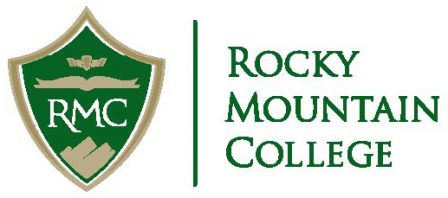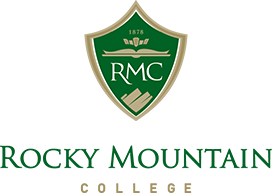Pre-Law Minor
February 3, 2022 2024-01-18 14:56Students planning to attend law school after completing a degree at Rocky Mountain College are encouraged to supplement their major by taking on a secondary pre-law minor. Along with the completion of all requirements for their major, pre-law students take core courses in government, law, and logic and choose among electives encompassing analytical reasoning, advanced writing, rhetoric, and ethics.
Required courses are intended to foster critical-thinking skills, develop advanced writing abilities, and acquire an understanding of the human condition as it relates to the issues of legal and social justice. Students in the program will also receive assistance with LSAT test preparation and the law school application process.
Minor in Pre-Law
A minimum of 20 semester hours is required, including:
Core Courses:
- POL 203: American Government
- POL 412: Constitutional Law
Analytical Reasoning
(select one of the following):
- MAT 152: To Infinity and Beyond
- PHR 205: Logic
Advanced Writing
(select one of the following):
- ENG 319: Creative Non-Fiction Writing
- ENG 325: Professional Writing
- ENG 359: History of Grammar and English
Rhetoric
(select one of the following):
- COM 240: Rhetoric of Western Thought
- COM 306: Organizational Communication
Ethics
(select one of the following):
- PHR 303: Ethics
- PHR 340: Christian Ethics
Electives
(select one of the following):
- AVS 312: Aviation Law
- BSA 331: Business Law
- IDS 205: Negotiations
- IDS 305: Mediation
- POL 321: History of Political and Social Thought
- PSY 201/SOC 201: Social Psychology
- SOC 321: Criminology
- or other relevant special topics course with permission of faculty
AVS 312 – Aviation Law
Semester: Fall
Semester hours: 3
This course provides a forum for understanding the statutes, regulations, and case law governing aviation. Topics of study include administrative law, FAA enforcement, aviation medical issues, business organizations, airline liability, aircraft accidents, aircraft transactions, and airline labor law.
Prerequisite: sophomore standing
BSA 331 – Business Law
Semester: Fall
Semester hours: 3
A course that explores the legal principles relating to business transactions: contracts, sales, commercial paper, intellectual property, and e-commerce. A study of the legal environment of business is emphasized. This course is often required as a prerequisite for master’s level business programs.
Prerequisite: ACC 210, ECO 205
COM 240 – Rhetoric of Western Thought
Semester: Spring
Semester hours: 3
This course investigates the evolution of rhetorical theories from ancient Greece to contemporary models of communication. It focuses on the application of theories to communication events in order to explicate how communication shapes culture.
Corequesite: COM 102
COM 306 – Organizational Communication
Semester: Fall
Semester hours: 3
This course examines how communication occurs in large cooperative networks, especially in professional work settings. It focuses on the roles leadership, management, and conflict resolution play in larger organizations. By the end of the course, students will understand how the values and cultures of any organization emerge through communication.
Prerequisite: COM 102 or permission of instructor
ENG 319 – Creative Non-Fiction Writing
Semester: Fall
Semester hours: 3
Students study examples of creative non-fiction and practice writing their own. They also gain experience incorporating research into their prose.
Prerequisite: ENG 119
ENG 325 – Professional Writing
Semester: Fall
Semester hours: 3
This course teaches concepts, practices, and skills for communicating technical, scientific, or business-related information. Topics include understanding how people read, designing documents, incorporating graphics, writing about statistical results, rewriting, editing, and using the Internet. This course may be especially useful for non-English majors, providing them with the tools and techniques to communicate their messages effectively.
Prerequisite:ENG 119
ENG 359 – History and Grammar of English
Semester: Fall; Alternate years
Semester hours: 3
Students are introduced to the linguistic and theoretic approaches to the study of English, including phonology and morphology. Students pursue an in-depth study of syntax, focusing on the grammar of words, phrases, clauses, and sentences. Students also review the history of English from proto-Germanic to the development of regional dialects, cultural variations, and “global” English.
IDS 304 – Negotiations
Semester: Fall
Semester hours: 3
Negotiation is the art and science of securing agreements between two or more interdependent parties. The purpose of this course is to understand the theory and processes of negotiation as it is practiced in a variety of settings. The course highlights the components of an effective negotiation and teach students to analyze their own behavior in negotiations. The course has a strong experiential component, providing students with an opportunity to develop their skills by participating in negotiations and integrating their experiences with the principles presented in the assigned readings and lectures.
IDS 305 – Mediation
Semester: Spring
Semester hours:3
Mediation is an interdisciplinary field. Mediators come from all disciplines and walks of life. A potential mediator ought to possess the patience of Job, the hide of a rhinoceros, and the wisdom of Solomon. Mediation is an alternative to a decision rendered by a judge, arbitrator, or other decision-maker. Mediators help the parties in a dispute to engage in constructive and creative communication, which will allow them to explore the issues and reach a mutually acceptable resolution of their dispute. The goal of the course is to provide those basic skills necessary to further pursue mediation, either as a profession or as another arrow in the student’s quiver of practical and life skills.
MAT 152 – To Infinity and Beyond
Semester: Offered at discretion of department
Semester hours:3
Exploration of a variety of modern mathematical topics. Topics will illustrate mathematics as a way of representing and understanding patterns and structures, as an art, as a tool in other disciplines, and as a historical force. Topics may include infinity, chaos, fractals, symmetry, networks, and others.
Prerequisite: MAT 100 or the equivalent
PHR 205 – Logic
Semester: Offered at discretion of department
Semester hours:3
An introductory course in the principles and methods used to distinguish correct from incorrect reasoning. This course aims to help students think and read critically and to write argumentative papers. Both inductive and deductive logic will be studied.
PHR 303 – Ethics
Semester: Spring; Alternate years
Semester hours: 3
A study relating ethics, as traditionally conceived in philosophy, to one or more current philosophical works in ethics. This course will provide students with a solid background in ethics, from Plato to Nietzsche. A discussion of a contemporary work in ethics will introduce students to topics that may be covered in depth in later seminars.
PHR 340 – Christian Ethics
Semester: Spring; Alternate years
Semester hours:3
How can a Christian make moral decisions? We will study the biblical basis for ethics and several modern Christian ethicists to understand how they move from the beliefs of Christianity to recommendations for specific ethical action.
POL 203 – American Government
Semester: Spring
Semester hours:3
This course provides an analysis of the American system of government on three levels. Students will examine the origins of our system of government, the nature and role of our Constitution with its functional and territorial distribution of powers, and the importance of government at the three levels.
POL 321 – History of Political and Social Thought
Semester: Offered at discretion of department
Semester hours: 3
The development of political and social ideas from ancient Greece to the present is examined.
Prerequisite: POL 101
POL 412 – Constitutional Law
Semester: Fall; Alternate years
Semester hours: 3
A case-method approach to the landmark decisions of the Supreme Court, with an emphasis on the doctrine of judicial review and the role of the Court in interpreting the Constitution and shaping American legal culture. The course will focus on the exercise and limitations of federal power in the areas of the economy, civil rights, and individual liberties, as well as the Constitutional basis on which statutes and other regulatory provisions are adjudicated. Special attention will be given to Constitutional clauses related to free speech, due process, and equal protection under the law.
PSY 201 – Social Psychology
Semester: Spring
Semester hours:3
Students study the behavior of individuals as it is controlled, influenced, or limited by the sociocultural environment, social interaction, and basic interrelations of the individual, society, and culture. This course is designed to enable students to see themselves as both shaping and being shaped by their culture. Attention is also focused on inclusion and diversity. This course is cross-listed with SOC 201.
Prerequisite: PSY 101
SOC 201 – Social Psychology
Semester: Spring
Semester hours:3
Students study the behavior of individuals as it is controlled, influenced, or limited by the sociocultural environment, social interaction, and basic interrelations of the individual, society, and culture. This course is designed to enable students to see themselves as both shaping and being shaped by their culture. Attention is also focused on inclusion and diversity. This course is cross-listed with PSY 201.
Prerequisite: PSY 101
SOC 321 – Criminology
Semester: Spring; Alternate years
Semester hours:3
This course focuses on the nature and extent of crime and delinquency, including a historical survey of explanatory theories focusing on the economic, social, and psychological causes of criminal behavior and current methods of treatment, policy, and prevention.
Prerequisite: SOC 101
Matthew O’Gara, Associate Professor
Contact
Rocky Mountain College
1511 Poly Drive
Billings, MT 59102


